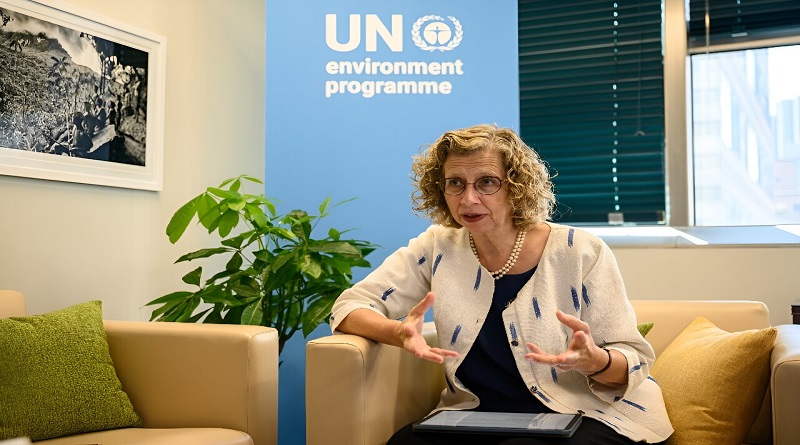UNEP’s 2024 Annual Report calls for dramatic uptick in ambition, action for environment
The UN Environment Programme’s (UNEP) Annual Report, released on Tuesday 18 February 2025, calls for a dramatic uptick in ambition and action for the environment. The 2024 Annual Report details the organization’s efforts over the past year to provide science and solutions to tackle growing environmental challenges, to convene and support multilateral environmental agreements and negotiations, to align funding with global processes, and to support Member States to deliver on commitments.
2024 saw a blitz of important environmental negotiations take place, including the sixth UN Environment Assembly (UNEA-6) in Kenya, the UN Biodiversity Conference (COP16) in Colombia, the UN Climate Conference (COP29) in Azerbaijan, the fifth session of negotiations on an international, legally binding instrument on plastic pollution in South Korea, and the UN Desertification COP (COP16) in Saudi Arabia. While each of these meetings made significant progress in some areas, some key issues remained unresolved, highlighting the need for nations to work even closer together – and with more determination – to ensure agreement on and implementation of measures that would bring the world closer to a more sustainable and just planet.
Last year, UNEP’s reports provided the latest science on pressing issues of global environmental concern. The annual Emissions Gap Report cautioned that nations must close huge emissions gaps in new climate pledges and deliver immediate action or lose the Paris Agreement goal of limiting global warming to 1.5°C by 2100.
UNEP’s 2024 Adaptation Gap Report found that while international public adaptation finance flows to developing countries increased from by $6 billion between 2021 and 2022, a huge gap continues to exist between adaptation finance needs and current international public funding available for adaptation.
In Gaza, a preliminary environmental assessment by UNEP found that the conflict has caused unprecedented levels of pollution, with sewage, debris and toxic munitions contaminating soil, water, and the air. The report notes that environmental degradation risks irreversible damage to Gaza’s natural ecosystems.
UNEP is also providing crucial data to support nations and companies as they act on methane emissions. The Methane Alert and Response System, part of UNEP’s International Methane Emissions Observatory – a satellite data and machine-learning system that identifies major methane leaks – has delivered more than 1,000 notifications to governments and companies over the last two years. The alerts led to the plugging of major leaks in Algeria and Nigeria, preventing the release of greenhouse gases equivalent to those that 1 million cars would produce over a year.
Through 2024, UNEP mobilized significant funding in co-financing from partners, enabling countries to focus on electric mobility, energy efficiency, renewable energy, and low-emission buildings. These initiatives are expected to benefit more than 17 million people and reduce greenhouse gas emissions by almost 300 million tonnes, the equivalent of taking 65 million cars off the road.
Reflecting on the past year and looking ahead at 2025, UNEP’s Executive Director, Inger Andersen, said: “The reality is that environmental multilateralism is sometimes messy and sometimes arduous. But even in complex geopolitical times, collaboration across borders and across our differences is the only option to protect the foundation of humanity’s existence – Planet Earth.”
“UNEP calls for a dramatic uptick in ambition and action in the coming year. Nations must promise and deliver huge cuts to greenhouse gas emissions in the next round of Nationally Determined Contributions (NDCs), due in February 2025. They must start delivering the necessary finance for climate adaptation and for desertification and biodiversity action. And they must work towards agreeing on a strong instrument to end plastic pollution before UNEA-7 in December,” she added.
Executive Director, Inger Anderson, said, “So, the reality is that environmental multilateralism is sometimes messy and sometimes arduous. But even in complex geopolitical times, collaboration across borders and across our differences is the only option to protect the foundation of humanity’s existence – Planet Earth.
Last year brought both successes and disappointments in global efforts to tackle the triple planetary crisis: the crisis of climate change; the crisis of nature and biodiversity loss and desertification; and the crisis of pollution and waste.
At the UN Biodiversity Conference (COP16) in Cali, Colombia, nations agreed to formally recognize and expand the role of Indigenous Peoples and local communities in saving biodiversity and to operationalize a mechanism to share benefits from digital genetic information – but issues around resource mobilization and a monitoring framework were carried over to the resumed session to be held in February 2025. At the UN Climate Change Conference (COP29) in Baku, Azerbaijan, nations agreed on international carbon market standards and promised to triple the amount of financing for developing nations hit by climate change – but this commitment fell short of what many countries had called for.
In Busan, Republic of Korea, nations made substantial progress towards a global instrument to end plastic pollution, with emerging convergence on 29 out of 32 articles – but the talks were adjourned without a final text being agreed. Countries will now need to work on bridging their differences to meet the aspirations of the 2022 UN Environment Assembly (UNEA) resolution to end plastic pollution. At the UN conference on land and desertification in Riyadh, Saudi Arabia, nations launched the Riyadh Action Agenda, committing US$12 billion for land restoration and drought resilience initiatives, and the Riyadh Global Drought Resilience Partnership – but were unable to agree on a legally binding protocol to address drought, which has plagued countries across the world, from Africa and Asia to Latin America and Europe.
So, the reality is that environmental multilateralism is sometimes messy and sometimes arduous. But even in complex geopolitical times, collaboration across borders and across our differences is the only option to protect the foundation of humanity’s existence – Planet Earth. UNEP calls for a dramatic uptick in ambition and action in the coming year. Nations must promise and deliver huge cuts to greenhouse gas emissions in the next round of Nationally Determined Contributions (NDCs), due by February. They must start delivering the necessary finance for climate adaptation and for desertification and biodiversity action. And they must work towards agreeing on a strong instrument to end plastic pollution before UNEA-7 in December.
As this annual report shows, UNEP has been working tirelessly to help create a broad tent for this to happen. UNEP’s science has laid out exactly what nations need to do in their NDCs and supported many nations in preparing these pledges. UNEP is providing crucial data to support nations and companies as they act on methane emissions, with real success. UNEP is providing finance and technical support on everything from ecosystem restoration to clean air. UNEP is working with the private sector to align their businesses and financing with action on the triple planetary crisis. And projects that UNEP supports are making a tangible difference in the lives of people around the world from Kenya to Mexico to Niue, enhancing resilience and reducing vulnerabilities.
But humanity is not out of the woods. Temperatures are rising. Ecosystems are disappearing. And pollution remains a deadly threat. These are global problems that require global solutions. The world must pull together to build a fairer, more sustainable planet. And UNEP will be there to support countries every step of the way.




